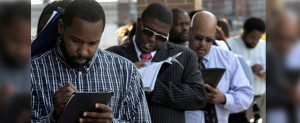 For the first time since 2007, the jobless rate for African Americans fell below 10 percent in the second quarter of 2015, the Labor Department said Friday, the Wall Street Journal reported. However, despite the slight improvement, at 9.5 percent, it’s still more than double the unemployment rate of 4.6 percent for whites and nearly twice the national average of 5.3 percent.
For the first time since 2007, the jobless rate for African Americans fell below 10 percent in the second quarter of 2015, the Labor Department said Friday, the Wall Street Journal reported. However, despite the slight improvement, at 9.5 percent, it’s still more than double the unemployment rate of 4.6 percent for whites and nearly twice the national average of 5.3 percent.
Why the disparity? Valerie Wilson, director of the Economic Policy Institute’s Program on Race, Ethnicity and the Economy, says it’s due to two major factors – education and work experience.
From the Journal:
Twenty-two percent of blacks had completed four years of college in 2014, versus 32% of whites, according to the Census Bureau.
Only eight states have seen unemployment rates for black workers fall below pre-recession levels. In Alabama, the African unemployment rate is more than twice what it was pre-recession: 10.9%, compared with less than 5% throughout 2007.
The nationwide average masks wide variations between states and between races. For example, Tennessee has the lowest unemployment rate for black workers, at 6.9%. But that’s about the same rate as the state with the highest unemployment rate for whites, West Virginia, where unemployment stood at around 7% for the quarter.
But researchers at the Center for Economic Policy Research said, there’s another factor at play – discrimination – the Journal also reported. Black job applicants with the identical qualifications as whites and Hispanics, are less likely to be called back for job interviews or hired, their research shows.
Wilson agrees that racism and racial bias, whether explicit or implicit, directly or indirectly, are a major part of the ongoing disparity in the jobless rate between whites, blacks and Hispanics.



That’s why I would urge you to look into Bernie Sanders for President — the ONLY candidate who has absolutely refused money from the big #Billionaires running this country and he is a lifelong civil rights advocate — He marched with Martin Luther King Jr. and he recently was at Selma to commemorate with black leaders 50 years of civil rights.